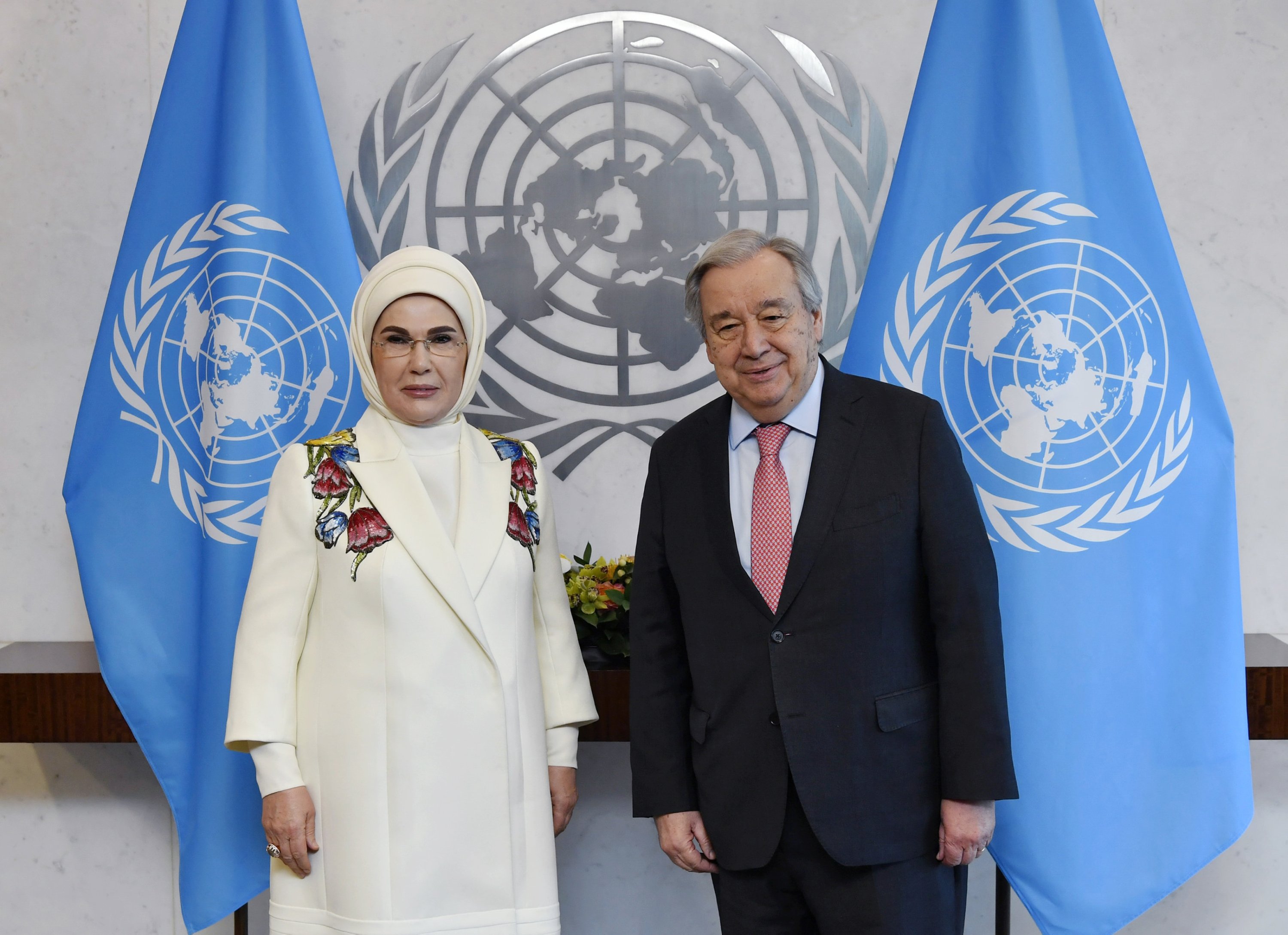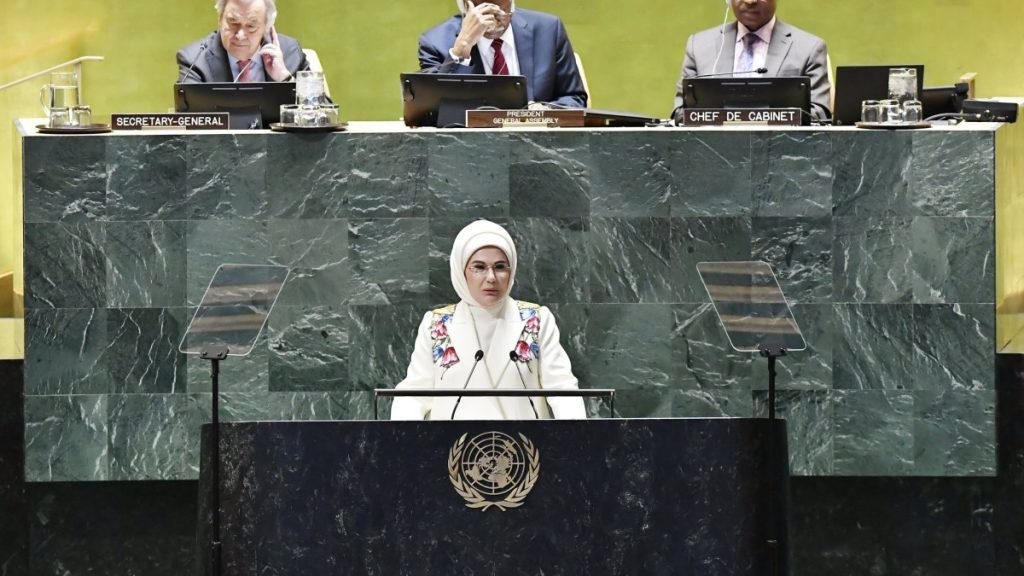First lady Emine Erdoğan, who is also the chair of the United Nations High-Level Advisory Council on Zero Waste, has emphasized the significant environmental impact of the fashion and textile industries and called for collective action toward “slow and sustainable fashion.”
“Implementing slow and sustainable fashion has become a necessity for all of us,” she said at a special event on Friday, marking the International Day of Zero Waste.
Erdoğan’s remarks were made during an event held at the U.N. General Assembly, organized by Türkiye’s Permanent Mission to the U.N., the Zero Waste Foundation, the U.N. Environment Programme (UNEP), and U.N.-Habitat.
U.N. Secretary-General António Guterres also attended the event, themed “Towards Zero Waste in Fashion and Textiles.”

This year’s celebration marked the third observance of International Day of Zero Waste. “The Zero Waste Movement is growing each year, reaching more and more people globally. We are fortunate to witness the creation of a global awareness network,” the first lady said.
Erdoğan expressed gratitude to Guterres for his strong support of the Zero Waste Project. She also thanked UNEP, U.N.-Habitat, and the countries that have supported the movement, as well as the volunteers worldwide working toward the benefit of nature and humanity.
Highlighting the influential role of the fashion and textile sectors in shaping public preferences and behaviors, Erdoğan pointed out that the industry contributes significantly to environmental pollution. “Unfortunately, the industry’s ‘use-and-dispose’ mentality has become its main characteristic,” she said. “That is why we chose ‘Towards Zero Waste in Fashion and Textiles’ as the theme for this year’s celebration.”
Erdoğan added that this is not a new discovery, but rather a return to a concept that was once prevalent. She explained that in the past, long-lasting and high-quality products were created, with designers releasing no more than two collections per year. Today, the number of collections can reach up to six.
She also criticized the powerful role of advertisements in creating an irresistible consumer mindset, leading people to chase after fleeting fashion trends. Erdoğan stressed that garments that have not physically worn out are often mentally considered obsolete and discarded.
“Fashion trends in metropolitan areas, driven by climate change, are no different from the increasingly destructive storms we face,” she said. “No piece of clothing is merely fabric, color and design; each item carries the cost of wasted natural resources, environmental pollution, and the increasing effects of climate change. This heavy burden is passed on to all of humanity.”
Erdoğan shared a startling statistic: “Every second, a truckload of clothes is either burned or sent to waste disposal sites worldwide.” She pointed out that while we can easily discard clothes, nature cannot do the same.
Echoing the words of famous late Turkish thinker Cemil Meriç, Erdoğan emphasized the conflict between consumerism and human relationships: “People were created to be loved; things were created to be used. The chaos in the world arises from loving things and using people.”
She stressed the need to end the flawed connection between happiness and consumption, noting that the damage to nature, ecosystems, and resources is a direct result of consumer culture. Erdoğan called for action in partnership with the U.N., urging a collective effort to combat waste pollution.
A special exhibition titled “We Have Enough” was also held at the U.N., highlighting that 60% of discarded items are still usable. Erdoğan emphasized the ease of resource recovery through recycling and reusing, stressing that repairing, transforming, and reusing items should become the norm.
She called on fashion designers to lead the change, urging them to use their designs to build identities and movements. “Small changes in our lives can lead to powerful global transformations,” Erdoğan said.
Erdoğan further emphasized that extending the life span of garments could reduce greenhouse gas emissions by 44%. She called for a revival of traditional textile practices, focusing on durability and responsible consumption.
Turkish leadership
Reflecting on Türkiye’s leadership in the Zero Waste Project, Erdoğan expressed confidence that Turkish fashion designers would pioneer a new chapter in sustainable fashion. “Just as Türkiye became a leader in zero waste, I believe Turkish designers will take the lead in this field as well,” she said.
Erdoğan concluded by underscoring her country’s responsibility as a global leader. “We are all responsible for our common home, the Earth,” she said, calling for fair distribution and participation in climate action. She reiterated her support for the U.N. reform proposed by President Recep Tayyip Erdoğan, highlighting its significance in the fight against climate change.
She also shared the remarkable achievements of Türkiye’s Zero Waste Project, which has resulted in the recycling of over 74 million tons of waste, saving 552 million trees and preventing 150 million tons of greenhouse gas emissions. Additionally, the project has provided zero waste education to 23 million people.
The first lady highlighted Türkiye’s significant role in the textile sector, stating that the country is making significant strides toward sustainable textile production, including recycling textile waste and creating eco-friendly products. “We are taking steps to reduce the environmental impact of production processes and are producing new yarns and fabrics from recycled materials,” she said.
She concluded by inviting people from all walks of life to join the dream of a waste-free world, urging collective action to secure a brighter future for future generations.
“Let us remember,” she said, “the secret of the ocean lies in the drop. All we need is belief and unity.”


